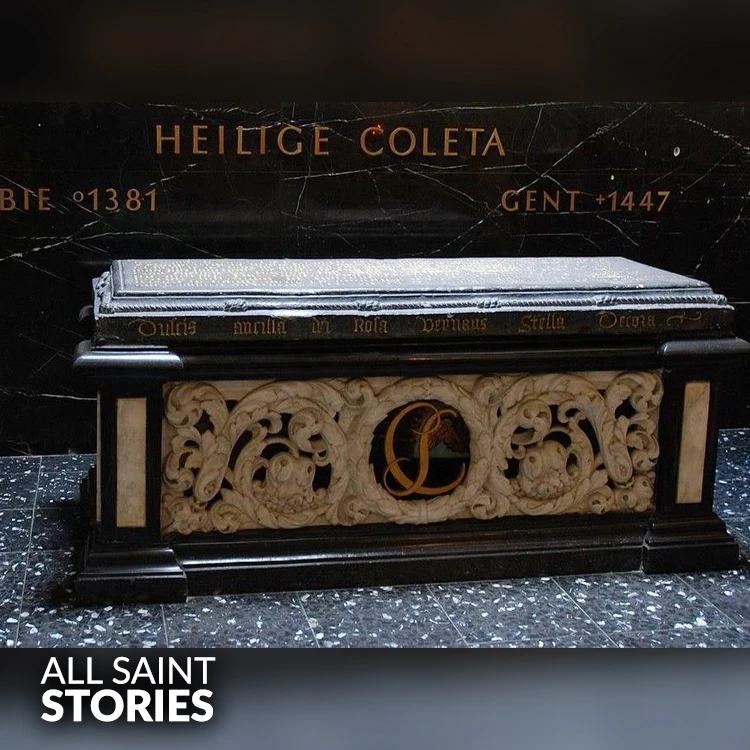"St. Colette, faithful servant of God, You dedicated your life to prayer, humility, and care for the poor. Intercede for us that we may grow in holiness and compassion. Guide us to live with a heart full of charity and trust in God’s will. Help us to follow your example of perseverance in faith. Amen."
ST. COLETTE
ST. COLETTE

St. Colette was a French nun and reformer of the Poor Clares, known for her extreme humility, devotion to prayer, and miraculous visions. She revitalized the Franciscan Second Order, emphasizing poverty, strict observance, and holiness.
St. Colette was born on January 13, 1381, in Corbie, France, to an elderly couple who had long prayed for a child. Her father, a carpenter at the Benedictine Abbey, named her Nicolette (later shortened to Colette). From an early age, she displayed a deep inclination toward prayer, penance, and solitude.
After her parents’ death, Colette sought a religious life and first joined the Benedictines, then the Beguinages, but felt neither was her true calling. She later became a hermit under the spiritual direction of a Franciscan priest, living in seclusion near the abbey in Corbie. During this time, she received divine revelations calling her to reform the Poor Clares and return them to the strict poverty and discipline of St. Clare and St. Francis.
With the blessing of Pope Benedict XIII, Colette traveled throughout France, establishing new convents and reforming existing ones. Her movement became known as the Colettine Poor Clares, emphasizing prayer, poverty, silence, and deep contemplation. She encountered much opposition but gained support from influential figures, including St. John of Capistrano and the Duke of Burgundy.
Throughout her life, Colette was known for her visions, miracles, and ability to predict events. She healed the sick, brought people back to faith, and even resurrected a dead child. Despite suffering from illnesses and hardships, she remained humble and devoted to her mission.
She died on March 6, 1447, in Ghent, Belgium, at one of the convents she had established. Her remains were later moved to Poligny, France, where they are venerated today. Pope Pius VII canonized her in 1807.
Her legacy continues through the Colettine Poor Clares, who still follow her reforms today.
Video Not Found
The information on this website is compiled from various trusted sources. While we aim for accuracy, some details may be incomplete or contain discrepancies.
If you notice any errors or have additional information about this saint, please use the form on the left to share your suggestions. Your input helps us improve and maintain reliable content for everyone.
All submissions are reviewed carefully, and your personal details will remain confidential. Thank you for contributing to the accuracy and value of this resource.
Credits & Acknowledgments
- Anudina Visudhar (Malayalam) – Life of Saints for Everyday
by Msgr. Thomas Moothedan, M.A., D.D. - Saint Companions for Each Day
by A. J. M. Mausolfe & J. K. Mausolfe - US Catholic (Faith in Real Life) – Informational articles
- Wikipedia – General reference content and images
- Anastpaul.com – Saint images and reflections
- Pravachaka Sabdam (Malayalam) – Saint-related content and insights
We sincerely thank these authors and platforms for their valuable contributions. If we have unintentionally missed any attribution, please notify us, and we will make the correction promptly.
If you have any suggestion about ST. COLETTE
Your suggestion will help improve the information about this saint. Your details will not be disclosed anywhere.
© 2026 Copyright @ www.allsaintstories.com






 English
English
 Italian
Italian
 French
French
 Spanish
Spanish
 Malayalam
Malayalam
 Russian
Russian
 Korean
Korean
 Sinhala
Sinhala
 Japanese
Japanese
 Arabic
Arabic
 Portuguese
Portuguese
 Bantu
Bantu
 Greek
Greek
 German
German
 Dutch
Dutch
 Filipino
Filipino